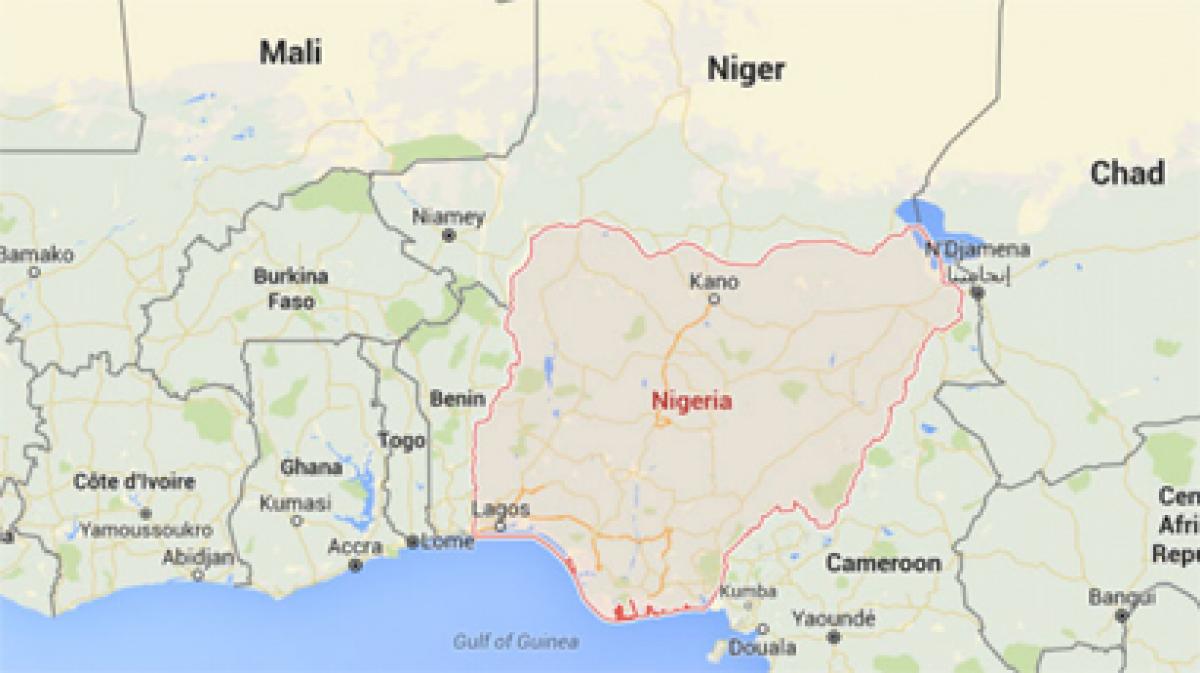Live
- After caste census, Dalits, tribals, poor will recognise their true strength: Rahul Gandhi
- Who was Birsa Munda, whose 'Ulgulan' declared the end of British rule in Jharkhand?
- Five selected as Indian Rhodes Scholars for 2025
- Raj Thackeray releases MNS election Manifesto with a ‘key’ to implementing it
- COP29: 3 methodologies approved for issuing high-integrity carbon credits
- MP: Celebrations of Birsa Munda's birth anniversary begin in presence of Guv, CM in Shahdol
- NGT seeks details of waste to energy plants not complying with norms
- Dev Deepawali 2024: Significance, Rituals, and How to Celebrate with Lamps
- Air quality in Kolkata dips to ‘very unhealthy’ category
- Air pollution may raise risk of lung cancer, asthma in children, say experts
Just In

At least 13 people were killed on Wednesday when three suicide bombers blew themselves up in the northeast Nigerian town of Chibok, where Boko Haram kidnapped more than 200 schoolgirls.
At least 13 people were killed on Wednesday when three suicide bombers blew themselves up in the northeast Nigerian town of Chibok, where Boko Haram kidnapped more than 200 schoolgirls.
The blasts happened at about midday (1100 GMT) as the remote town in Borno state was packed with traders from surrounding villages for the weekly market, Chibok elder Ayuba Chibok told AFP.
"Ten died on the spot and another one died on the way to hospital," said health worker Dazzban Buba, who volunteered to treat the injured at hospital.
"A woman and a child died as they were being admitted (to hospital), so now the death toll stands at 13. Thirty others were injured, 21 critically."
The blasts bore the hallmarks of Boko Haram, which has repeatedly hit "soft" civilian targets such as markets, mosques and bus stations as well as military and civilian vigilante checkpoints.
Chibok came to prominence in April 2014 when Islamist fighters stormed a boarding school and kidnapped 276 girls, causing global outrage.
Fifty-seven girls managed to escape in the immediate aftermath but 219 are still being held and have not been seen since they appeared in a Boko Haram video in May that year.
Chibok was briefly overrun by the Islamic State group-allied rebels in November 2014 but recaptured by the military after several days.
Ayuba Chibok and Buba both said Wednesday's blasts were suicide attacks and had prompted terrified residents to lock themselves inside their homes or flee in fear of repeat attacks.
"The first bomber set off his explosives at the checkpoint where people coming into the town were being searched," said the town elder.
"A second bomber managed to get into the market and blew himself up. A third bomber was identified and residents pursued him.
"When he realised he was about to be apprehended he detonated his explosives in an area not far from the market."
Lull in attacks
Buba said he rushed to help his brother who was injured in the first blast in the Bamzir Road area of the town.
The second blast happened shortly afterwards, fitting a pattern of Boko Haram suicide attacks with multiple bombers setting off their devices almost simultaneously.
But Buba said it was still unclear whether the third bomber deliberately detonated his explosives or whether the device was triggered when troops opened fire as he fled.
Buba said the 30 injured were mostly suffering from burns and fractures, and that nine had been discharged, he added.
There was no immediate comment from the police, the military or the government's main relief agency.
Recent weeks have seen a lull in Boko Haram attacks, with only three recorded in Nigeria this month but those that have occurred underline the difficulty in protecting hard-to-reach rural areas.
The insurgents raided a village in Yobe state on Sunday, killing one man, while on January 11, another raid in the Adamawa state town of Madagali left seven dead.
Seven people were killed in a raid and suicide bomb attack in Izgeki village on January 5. Gunmen also looted food and burnt a large part of Nchiha village near Chibok earlier the same day.
On December 6, there was a similar attack in Takulashi village, also near Chibok, which again saw fighters raid food and steal more than 200 cattle.
Nigeria's President Muhammadu Buhari on December 24 declared the rebels were "technically" defeated but at least 66 people were then killed in raids and suicide bombings in the days following.
According to an AFP tally, more than 1,650 people have been killed since Buhari came to power in May last year, vowing to crush the insurgency, which has left at least 17,000 dead since 2009.
On Monday, 32 people were killed when at least three suicide bombers blew themselves up at a market in Bodo village in northern Cameroon.

© 2024 Hyderabad Media House Limited/The Hans India. All rights reserved. Powered by hocalwire.com







